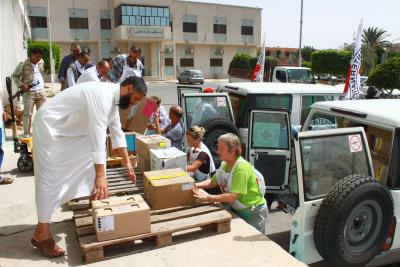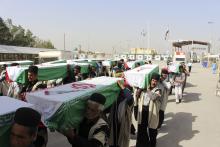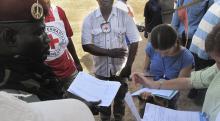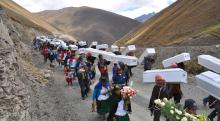Case prepared by Clara Delarue, Claudia Langianese, Giovanni Medici Tornaquinci, Eleanor Umeyor, LL.M. students at Roma Tre University under the supervision of Giulio Bartolini (IHL Professor), Tommaso Natoli and Alice Riccardi (Research assistants), Roma Tre University IHL Legal Clinic
A. LIBYA: HUMANITARIAN AGREEMENT FOR FEZZAN SIGNED AT SANT’EGIDIO ON 16 JUNE 2016
Humanitarian Agreement for Fezzan and Libya
Sant’Egidio, Rome, 16 June 2016
[...]
We, sons and daughters of southern Libya, convened in Rome by the Community of Sant’Egidio, signers of this document, mindful of the tragic situation experienced by the Libyan people as a whole, express particular concern about the suffering of the inhabitants of Fezzan and the worsening of the humanitarian situation.
In this regard, we shall do all we can, working as a united group, to facilitate the arrival of urgent aid that can fully reach all the inhabitants without any exclusion, in accordance with justice and without distinctions, while giving priority to the neediest categories, such as women, children and the elderly.
The necessary first step is to get urgent aid to health centres in the cities of Awbari, Burak ash-Shati, Traghen, Sebha, Ghat, Al Gatrun, Murzuq and Hun, and we will work and monitor them to ensure that they reach all the inhabitants. We propose to act as facilitators to draw the attention of the Libyan authorities, the international community, humanitarian organizations and agencies and donor countries to the needs of these centres. Aware of the importance of this first confidence-building step for coordination between cities and tribes, we are committed to identifying successive steps and initiatives aimed at alleviating the suffering of the population.
We appreciate the role played by the Community of Sant'Egidio in the mediation and organization of a serious and transparent dialogue, and in giving us the opportunity to build the confidence needed to coordinate our efforts to achieve reconciliation between different cities and tribes in southern Libya. We also appreciate the commitment of the Community of Sant'Egidio to continuing these efforts until complete stability and a lasting peace have been achieved in Libya. [...]
B. LIBYA: SANT’EGIDIO HUMANITARIAN AIDS REACHES THE FEZZAN REGION
[Source: ItalyUN, “Libya: Sant’Egidio, Humanitarian aids reaches the Fezzan region”, 4 July 2016, available at: Link not available.]
Ubari (Libya), July 4 – A first container of drugs – a result of the humanitarian agreement signed at the Sant’Egidio Headquarters in Rome on June 18 by Fezzan activists and politicians, representatives of the various tribes of the region – arrived at Ubari hospital in the deep south-west of Libya.
The drugs were sent thanks to the collaboration among the Community of Sant’Egidio, the Ministry of Foreign Affairs and International Cooperation and the WFP in Brindisi. The Ubari hospital provides care to 100,000 people and, even if damaged by the war, it’s still key to the whole province.
Further shipments are expected, providing supplies to other hospitals in the region that urgently need drugs and medical equipment, wrote the community on its website. The agreement on sending aid was signed on June 18 at the headquarters of “the small UN of Trastevere”: the goal was to ensure for the first time a presence of the Italian Cooperation, […] and some NGOs in the Fezzan region, a transit area for migrants en route to Europe.
[…]
Discussion
I. Classification of the Situation and Applicable Law
1. How would you classify the situation in Libya in 2016? What additional information would you need to make such a determination? (
GC I-IV, Art. 3;
P II, Art. 1)
2. Is the existence of an armed conflict relevant for determining if IHL was respected in this case?
II. Humanitarian Assistance
3. Do the parties to the conflict have an obligation to provide humanitarian assistance to the civilian population in times of armed conflict? If yes, does this obligation change depending on the classification of the conflict? Are the parties to the conflict obliged under IHL to allow assistance from organisations like the Community of Sant’Egidio, in providing civilians access to humanitarian aid? Is the consent of the State always necessary for such actors to provide assistance? Do civilian populations have a right to humanitarian assistance? (
GC I-IV, Art. 3;
GC IV, Art. 23;
P I, Art. 70;
P II, Art. 18;
CIHL, Rule 55)
5. What is the role of impartial humanitarian organizations under IHL? What activities can they perform during an armed conflict? Does access to humanitarian assistance also include freedom of movement of humanitarian relief personnel within concerned territories? Should the answer be in the affirmative, can this freedom be restricted? Under which conditions? (
GC IV, Art. 10;
CIHL, Rule 56)
III. Elements Contributing to Respect for IHL
6. What is the aim of the humanitarian agreement facilitated by the community of Sant’Egidio? In your opinion, can humanitarian organisations play a role in fostering compliance with IHL? How?
7. Which role local and tribal leaders can play vis-à-vis national authorities in facilitating access to victims in areas under their control? Do you think that such a humanitarian agreement can lead to increased respect for other IHL provisions by Parties to the conflict?
8. (Document A) In your opinion, can compliance with IHL, such as here in facilitating delivery of humanitarian aid, contribute to the process of national reconciliation? How would you describe the relationship between respect for IHL and peace processes?
9. (Document B) What benefits do you see in developing assistance programmes with the help of an entity such as the UN World Food Programme or a third State to the conflict? Does this cooperation make a difference in terms of efficiency?






